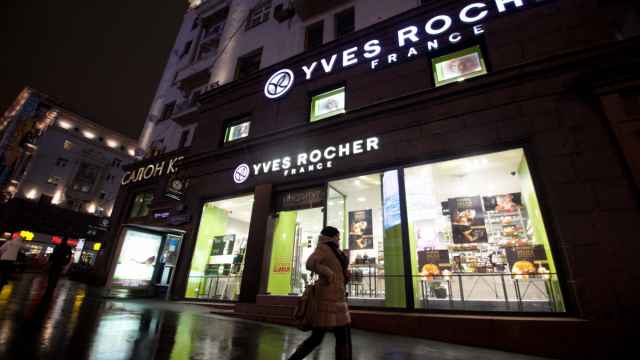TVER — Billboards lined the streets of Tver on Sunday urging voters headed to polling stations to choose the ruling United Russia party.
No posters for other parties were visible.
"Our billboards were taken down," Alexander Grishin, a lawmaker with A Just Russia seeking re-election in the Tver regional legislature, said in an interview.
United Russia's campaign slogan runs simply "Together We Can." A Just Russia's advertisement, now mostly replaced by blank billboards, showed an elderly woman asking United Russia's members to try to "survive on her pension," Grishin said.
Local United Russia officials were unavailable for comment, citing pre-election hecticness, but if the party has opposed ads from rivals, it is for good reason. Many residents in Tver, a down-on-its-luck city of 410,000 some three hours by train from Moscow, are weary of their slowly crumbling economy and rising utility bills. Defiantly, they elected a Communist-dominated city legislature in 2009 — a rarity in a country where United Russia tends to control all levels of local government.
While United Russia was expected to win big in the vote in Tver and most of the 3,000 other elections nationwide Sunday, the party appeared to be taking no chances. The elections are the last test of the party's influence before the State Duma vote in December and the big prize — the presidential race of 2012.
The average turnout in the 12 regional legislature elections slated for Sunday hovered between a robust 40 and 44 percent, according to early data by the Central Elections Commission. But in Tver, the turnout stood at a more modest 32 percent one hour before the polls closed.
The smiling faces of the "ruling tandem" of President Dmitry Medvedev and Prime Minister Vladimir Putin adorn some of United Russia's billboards in Tver, but Governor Dmitry Zelenin's face is nowhere to be seen.
This is a sure sign of trouble because United Russia usually uses regional leaders as figureheads for its campaigns. But United Russia has distanced itself from Zelenin, 49, a former billionaire businessman, after Tver fell to the Communists.
Zelenin's approval rating is simply too low to help the campaign, a United Russia source told Interfax in December. Analysts forecast that he will leave for good once his current, second term expires early next year.
The opposition spirit of 2009 remains high with some voters tired of broken promises to make life better in the Tver region, one of the country's poorest.
"I voted Communist. You don't even need to ask me," a woman in her mid-20s snapped as she walked out of a polling station located in a cultural center that bears a plaque of Tver native Andrei Tupolev, a legendary Soviet aircraft designer.
"I voted for the Communist Party but not even for the party itself — just against United Russia," said Ilya Kondratyev, 25, a bespectacled sales clerk who came to the polling station with his family.
The Communists hope for a majority in the regional legislature, with senior party official Vladimir Solovyov reminding voters earlier that the party would be allowed to nominate its own candidates for governor if it won.
A Communist victory would be a game-changer, because most governors in the 83 regions nationwide are United Russia nominees. But opponents are skeptical of the Communists' chances. A recent online poll showed the Liberal Democrats — who campaigned with the slogan "Vote LDPR or Continue to Suffer" — is actually set to come in second. The poll, staged by the local Karavan agency a week before the elections, gave United Russia 51.3 percent of the vote, with 20.8 percent going to the Liberal Democrats, 19.1 percent to the Communists and 8.9 percent to A Just Russia. The survey questioned 400 people and had a margin of error of 3.8 percentage points.
But an internal struggle bodes badly for the Communists, said A Just Russia's Grishin — himself a former Communist who was purged in 2009 for criticizing the Moscow leadership of the party.
"The beginning of the end of the Communist Party will start in the Tver region because they put inexperienced people in the legislature," he said in a reference to the party's widely panned candidates for seats in the city legislature. The party won in a party list vote.
Legislative seats give prestige and influence and are therefore coveted by businessmen and even murkier characters. The seats are believed by analysts to be a lucrative source of revenue for all parties.
The 2009 Communist victory is credited largely to the campaigning of two local media moguls, Igor Yalishev and Gennady Klimov, local political analyst Ksenya Kuzmina told Klimov's own Karavan Plus Ya newspaper earlier this month.
Zelenin tapped Yalishev for the regional cabinet in November, appointing him deputy governor in charge of internal politics. He also fired officials responsible for communal utilities and transportation in apparent populist measures meant to soothe voters.
In a bid to reach older voters, United Russia also drafted former Tver Mayor Oleg Lebedev for its party list.
Lebedev, who was jailed for several months over abuse of office in 2008, has since become Zelenin's adviser. He is still fondly remembered by many Tver residents for turning the city green.
The younger generation also favors Lebedev, but for a different reason. Rustam, 18, a proud father of twins who he took on a walk Sunday in a baby carriage, said he supported the former mayor because his wife was a godmother for their children. "We liked her, so we assume he is a good man," said Rustam, who voted for United Russia.
United Russia's link to the Kremlin also helps. Roman and Alexandra, a young couple studying together at a Tver teachers college, said they have voted for United Russia because they admire "President Putin." Putin is the leader of United Russia, although not a member.
For some, perception — whether true or false — matters more than party campaigning. "A friend of my son who is unemployed said he was paid to vote for United Russia, so I have decided to vote for the Liberal Democrats," said Galina, 53, an unemployed construction engineer.
There were no confirmed reports of vote-buying in Tver on Sunday. But many residents believed the practice and other forms of vote tampering were being employed by United Russia, leading to voter apathy.
"They will decide everything for us," a Tver taxi driver told a reporter, explaining why he opted not to go to the polls.
A Message from The Moscow Times:
Dear readers,
We are facing unprecedented challenges. Russia's Prosecutor General's Office has designated The Moscow Times as an "undesirable" organization, criminalizing our work and putting our staff at risk of prosecution. This follows our earlier unjust labeling as a "foreign agent."
These actions are direct attempts to silence independent journalism in Russia. The authorities claim our work "discredits the decisions of the Russian leadership." We see things differently: we strive to provide accurate, unbiased reporting on Russia.
We, the journalists of The Moscow Times, refuse to be silenced. But to continue our work, we need your help.
Your support, no matter how small, makes a world of difference. If you can, please support us monthly starting from just $2. It's quick to set up, and every contribution makes a significant impact.
By supporting The Moscow Times, you're defending open, independent journalism in the face of repression. Thank you for standing with us.
Remind me later.





